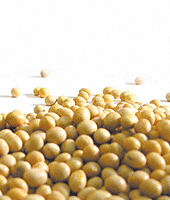Advertisement
A Sensible Part Of Your Diet
Soy food consumption has increased markedly over the past 10years,largely because of media coverage of research indicating soy may decrease risk of several chronic diseases including heart disease, osteoporosis, and breast and prostate cancer.In addition, because it is a rich source of isoflavones (phytoestrogens), soy almost certainly alleviates menopausal symptoms. This is why soy is … Continued
 Soy food consumption has increased markedly over the past 10years,largely because of media coverage of research indicating soy may decrease risk of several chronic diseases including heart disease, osteoporosis, and breast and prostate cancer.
Soy food consumption has increased markedly over the past 10years,largely because of media coverage of research indicating soy may decrease risk of several chronic diseases including heart disease, osteoporosis, and breast and prostate cancer.
In addition, because it is a rich source of isoflavones (phytoestrogens), soy almost certainly alleviates menopausal symptoms. This is why soy is viewed as an alternative to conventional hormone replacement therapy.
Although a few less reputable manufacturers may make exaggerated claims, overall, the soy industry has been responsible in its promotional efforts,many of which are supported by recommendations from independent health agencies. The American Cancer Society includes soy consumption as one of seven steps to reduce prostate cancer risk. The National Cancer Institute classifies genistein (the main soybean isoflavone) as a key anti-cancer agent, and the United States Food and Drug Administration (FDA) and the American Heart Association both endorse soy protein for cholesterol reduction.
Perhaps though, the best way to appreciate the amount of scientific interest in soy and isoflavones is to cite the number of scientific papers published each year on these subjects. Currently, about 600 papers are published annually. Despite this volume, the Internet is filled with sites devoted to the alleged dangers of soy consumption. In my view, this information is
inaccurate and represents selective use of scientific literature.
Soy foods have been consumed for centuries by some Asian populations. In awarding the health claim for cholesterol-lowering effects of soy protein, the FDA reviewed all safety issues related to soy consumption. Although there are more than 100 studies suggesting possible harm from eating soy, most of these are in vitro (cell studies) and animal studies, and this research actually represents only about one to two per cent of all soy research published.
When any food is the subject of intense research, some small percentage of research will suggest potential harm. One has to look at the total evidence and place most emphasis on the results from human studies published in the peer-reviewed literature when making conclusions about safety and efficacy. Following is a brief discussion of some of specific safety issues.
Thyroid: Seven well-designed clinical trials, including one that looked at the effects of isoflavone supplements, have found soy to have little or no impact on thyroid function in healthy adults.
Cognition: Three human trials have found that soy foods and isoflavone supplements improve certain aspects of cognition. It is too early to conclude that soy will reduce risk of dementia, but the evidence at this point is encouraging.
Testosterone and sperm count: Seven clinical trials have looked at the effects of soy foods or isoflavones on serum testosterone, and one of these looked at sperm count. None of the studies found any negative effects.
Estrogen and breast cancer: Most human studies show soy has either little effect or slightly decreases serum estrogen levels. Soy may modestly increase the length of the menstrual cycle, however. Both effects are seen as possibly reducing breast cancer risk, although most evidence suggests soy protects against breast cancer only if consumed when young. One 14-day study on soy caused changes that represent an increased breast cancer risk; however, the final results (published one year later) from this trial did not show this to be the case. Furthermore, a two-week study is too short to support clinical conclusions, as acknowledged by the authors of this study.
Soy is not a miracle food, but, in my view, it warrants a larger role in western diets. I recommend consuming about two servings per day, which in total provide about 15 grams of soy protein and 50 milligrams of isoflavones. At this intake, soy protein would still represent less than 20 percent of the total protein intake of western adults.




